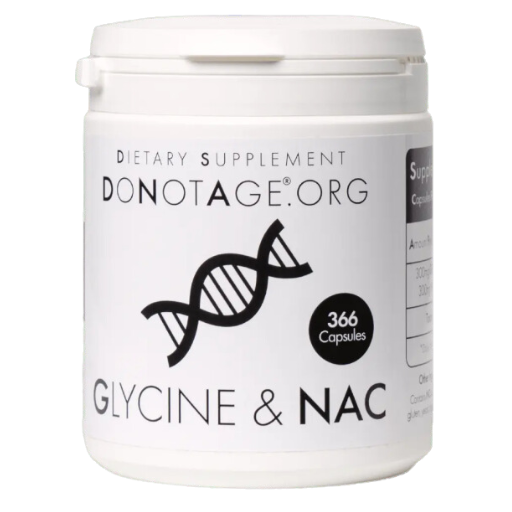Did you know Glycine, an essential amino acid, holds the key to numerous health benefits? From supporting heart and liver health to improving sleep quality and preventing muscle loss, Glycine is crucial in maintaining well-being. Whether you obtain it from protein-rich foods or as a dietary supplement, incorporating Glycine into your lifestyle can remarkably impact your overall health.
Disclaimer: This blog contains affiliate links, and I may receive a commission if you purchase through them at no additional cost to you.
Table of Contents
Key Takeaways:
- Glycine is an essential amino acid that supports various aspects of health.
- It helps build proteins needed for tissue and hormone maintenance.
- Glycine can be obtained from protein-rich foods or as a dietary supplement.
- Glycine has numerous health benefits, including supporting heart and liver health, improving sleep, reducing the risk of diabetes, and preventing muscle loss.
- Incorporating Glycine into your diet or taking Glycine supplements can help boost your overall health naturally.
The Role of Glycine in Antioxidant Production
Glycine plays a crucial role in antioxidant production within the body. As one of the three amino acids, Glycine helps your body produce glutathione, a powerful antioxidant that protects against oxidative damage.
Glutathione is often referred to as the “master antioxidant” because of its ability to neutralize free radicals and protect cells from damage. Free radicals are unstable molecules that can cause oxidative stress, leading to various health issues such as inflammation, premature aging, and chronic diseases.
Increasing your Glycine intake can support your body’s natural ability to produce glutathione, enhancing its antioxidant defenses. Adequate Glycine levels are crucial for ensuring proper production of this essential antioxidant.
“Glycine is a key player in the body’s production of glutathione, a powerful antioxidant that helps protect our cells from oxidative damage.” – Dr. Jane Maxwell, Nutrition Expert.
Glycine and Creatine for Muscular Performance
When it comes to maximizing your athletic performance and achieving your fitness goals, the role of Glycine in conjunction with creatine cannot be underestimated. Glycine, an essential amino acid, is crucial in synthesizing creatine, a natural compound found in muscle cells that provides energy for high-intensity, explosive movements.
Studies have shown that supplementing with Glycine can significantly improve muscle size, strength, and power. The combination of Glycine and Creatine has a synergistic effect, allowing athletes and individuals involved in resistance training to push their limits and reach new performance levels.
So, how does Glycine contribute to enhanced muscular performance? The process begins with converting Glycine into Creatine, which is then stored in the muscles and used as a readily available energy source during intense physical activity. By supplementing with Glycine, you supply your body with the building blocks needed to produce more creatine and fuel your workouts.
In addition to its role in creatine production, Glycine positively affects muscle recovery. It promotes the synthesis of collagen, a protein essential for the repair and growth of muscle tissue. Supplementing with Glycine can help minimize muscle damage and enhance recovery, allowing you to bounce back faster and train harder.
To illustrate the benefits of Glycine and creatine for muscular performance, let’s examine the findings of a study conducted on 25 resistance-trained men. The participants were randomly assigned to either a Glycine and Creatine supplementation or a placebo group. After ten weeks of resistance training, the Glycine and Creatine group showed significant muscle strength and power improvements compared to the placebo group.
In conclusion, incorporating Glycine and Creatine into your supplement regimen can significantly improve muscular performance. By enhancing Creatine synthesis and promoting muscle recovery, Glycine is vital in supporting athletes and fitness enthusiasts in achieving their goals. Whether you’re a professional athlete or want to take your workouts to the next level, consider adding Glycine and Creatine to your fitness arsenal for peak performance and exceptional results.
Glycine as a Key Component of Collagen
Collagen, the most abundant protein in the body, contains high amounts of Glycine. Glycine plays a crucial role in the formation and strength of collagen, which supports skin, joint, and bone health. Supplementing with Glycine or collagen has been shown to improve skin health, relieve joint pain, and prevent bone loss.
The importance of collagen in maintaining optimal skin health cannot be overstated. Collagen provides structural support to the skin, keeping it firm, plump, and youthful-looking. As we age, collagen production decreases, leading to wrinkles, sagging skin, and other signs of aging. Supplementing with Glycine or collagen can help replenish your body’s collagen levels and support the health and appearance of your skin.
Glycine and collagen are beneficial for joint health and skin health. Collagen acts as a cushion between bones, protecting the joints and preventing friction. Glycine is essential for synthesizing collagen, ensuring that the joints have a sufficient supply of this important protein. By supplementing with Glycine or collagen, you can support joint health, reduce inflammation, and alleviate joint pain and stiffness.
Glycine and collagen also play vital roles in maintaining strong and healthy bones. Collagen provides the framework for bone formation, while Glycine contributes to the strength and stability of collagen fibers. Supplementing with Glycine or collagen can help protect against bone loss and reduce the risk of conditions such as osteoporosis.
Overall, Glycine’s involvement in collagen synthesis makes it an essential nutrient for promoting skin health, supporting joint function, and maintaining strong bones. Whether you choose to supplement with Glycine or collagen, incorporating these nutrients into your routine can provide a natural boost to your overall health.
Enhancing Sleep Quality with Glycine
Glycine, an essential amino acid, has been found to have incredible benefits in improving sleep quality. Its calming effect on the brain helps promote relaxation and better sleep. Research studies have shown that taking Glycine before bed can profoundly impact sleep, resulting in reduced time to fall asleep, enhanced sleep quality, decreased daytime sleepiness, and improved cognitive function.
The sleep-enhancing effects of Glycine may be attributed to its ability to lower core body temperature. During sleep, the body naturally lowers its temperature, and Glycine aids in this process, creating an optimal environment for quality sleep. By regulating body temperature, Glycine promotes a deeper and more restorative sleep, ensuring you feel refreshed and rejuvenated.
In a study published in the journal Sleep, participants who took 3 grams of Glycine before bed experienced reduced time to fall asleep and enhanced sleep quality compared to the placebo group. They reported feeling more refreshed and alert during the day, highlighting the positive impact of Glycine on overall sleep quality.
By incorporating Glycine into your sleep routine, you can experience its transformative effects on your sleep quality. Whether you struggle with falling asleep, staying asleep, or waking up feeling unrested, Glycine can help create a more peaceful and rejuvenating sleep experience.
Glycine Sleep Quality Tips:
- Consult a healthcare professional to determine the appropriate Glycine dosage for your specific sleep needs.
- Take Glycine approximately 30 minutes before bedtime for optimal absorption and effectiveness.
- Create a relaxing bedtime routine, including calming activities like reading or practicing deep breathing exercises, to enhance the sleep-inducing effects of Glycine.
- Ensure your sleep environment is conducive to quality rest by controlling noise, light, and temperature.
- Combine Glycine supplementation with other healthy sleep habits, such as maintaining a consistent sleep schedule and avoiding caffeine and electronic devices close to bedtime.
Overall, Glycine is a valuable tool in improving sleep quality naturally. By incorporating Glycine into your bedtime routine, you can unlock its transformative benefits, leading to more restful and rejuvenating sleep.
Protecting the Liver from Alcohol-Induced Damage with Glycine
Glycine plays a crucial role in protecting the liver from damage caused by excessive alcohol consumption. It stimulates the metabolism of alcohol in the stomach, reducing its concentration in the liver and preventing the development of fatty liver and alcoholic cirrhosis. Glycine has also been found to reverse liver damage caused by alcohol intake in animal studies.
How Glycine Protects the Liver
Excessive alcohol consumption can lead to serious liver damage, including fatty liver and alcoholic cirrhosis. Glycine helps mitigate these effects by supporting the metabolism of alcohol in the stomach, reducing its impact on the liver. Additionally, Glycine has shown promising results in reversing liver damage caused by alcohol intake in animal studies.
Alcohol-induced liver damage occurs in several stages. Initially, alcohol is metabolized by enzymes in the stomach, but excessive alcohol consumption overwhelms this process. As a result, alcohol reaches the liver in higher concentrations, leading to oxidative stress, inflammation, and damage to liver cells.
Glycine acts as a protective agent by facilitating the metabolism of alcohol in the stomach. It enhances the activity of the enzyme alcohol dehydrogenase, which breaks down alcohol into acetaldehyde. Acetaldehyde is metabolized into acetate, a less harmful substance readily eliminated from the body.
In addition to its role in alcohol metabolism, Glycine helps counteract alcohol’s damaging effects on liver cells. It acts as an antioxidant, reducing oxidative stress and inflammation in the liver. Glycine supplementation has been shown to decrease markers of liver damage and improve liver function in animal studies.
Glycine and the Prevention of Liver Diseases
By protecting the liver from alcohol-induced damage, Glycine plays a crucial role in preventing the development of liver diseases such as fatty liver and alcoholic cirrhosis. Fatty liver, characterized by fat accumulation in liver cells, can progress to more severe conditions if left untreated.
Glycine’s ability to reverse liver damage caused by alcohol consumption suggests its potential in treating and preventing liver diseases. Animal studies have shown that Glycine supplementation can reduce liver fat accumulation, inflammation, and fibrosis, which are key features of liver diseases.
Overall, incorporating Glycine into your dietary routine or considering Glycine supplementation can be an effective strategy for protecting your liver from alcohol-induced damage and promoting liver health. However, it is essential to consult with a healthcare provider before making any significant changes to your diet or starting new supplements.
Supporting Heart Health with Glycine
Glycine supports heart health and reduces the risk of heart disease and heart attacks. It offers protection against heart disease by preventing the accumulation of compounds linked to atherosclerosis, a condition characterized by plaque buildup in the arteries. By inhibiting the formation of these compounds, Glycine helps maintain clear and healthy blood vessels, ensuring optimal cardiovascular function.
In addition to preventing plaque formation, Glycine also improves the body’s ability to use nitric oxide, a molecule that promotes vasodilation and increases blood flow. By enhancing nitric oxide function, Glycine helps lower blood pressure and maintain healthy blood vessel elasticity, reducing the strain on the heart and decreasing the risk of cardiovascular problems.
Higher Glycine levels have been associated with a lower risk of heart disease and heart attacks. Research has shown that individuals with high levels of Glycine in their blood have better heart health markers, including lower triglycerides and higher beneficial HDL cholesterol. These findings highlight the importance of Glycine in maintaining cardiovascular health.
Incorporating Glycine into your diet or considering Glycine supplements can support your heart health and enhance your overall cardiovascular well-being. However, it is essential to consult with a healthcare provider before starting any new supplements or making significant changes to your diet.
Glycine and Type 2 Diabetes Management
Glycine supplements have shown promising potential in managing type 2 diabetes. This essential amino acid plays a vital role in regulating blood sugar levels by enhancing insulin secretion and improving insulin action. Higher Glycine levels have also been associated with a reduced risk of developing type 2 diabetes.
Glycine’s impact on insulin response makes it a valuable tool in diabetes management. By increasing insulin secretion, Glycine helps cells take up glucose from the bloodstream, promoting better blood sugar control. Additionally, Glycine enhances insulin action, enabling cells to use the present insulin efficiently.
Insulin is a hormone the pancreas produces that helps regulate blood sugar levels. In people with type 2 diabetes, insufficient insulin production or the body’s cells become resistant to insulin’s effects, leading to elevated blood sugar levels. Glycine addresses one of the key issues in managing type 2 diabetes by improving insulin response.
Supplementing with Glycine may offer several benefits for individuals with type 2 diabetes:
- Improved blood sugar control: Glycine supplements can help regulate blood sugar levels by enhancing insulin secretion and action.
- Reduced risk of complications: Better blood sugar control can lower the risk of developing complications associated with type 2 diabetes, such as heart disease, nerve damage, and kidney disease.
- Promotion of overall health: Glycine’s impact on insulin responsecan improve the overall health and well-being of individuals with type 2 diabetes.
If considering Glycine supplementation for type 2 diabetes management, consulting with a healthcare provider is essential. They can guide you on the appropriate dosage and ensure that Glycine supplements suit your needs.
Remember, while Glycine shows promise in managing type 2 diabetes, it is not a substitute for a healthy lifestyle. A balanced diet, regular exercise, and medication adherence remain vital components of diabetes management.
“Glycine supplementation may benefit individuals with type 2 diabetes by improving insulin response and blood sugar control. However, it is crucial to work with a healthcare professional to ensure safe and effective use.” – Dr. Jane Thompson, Endocrinologist.
Preventing Muscle Loss with Glycine
Glycine plays a vital role in preventing muscle loss that occurs due to aging, malnutrition, stress, or illness. It is an essential amino acid that stimulates muscle growth and preservation, making it a promising supplement for maintaining overall health and functional status.
Glycine and Muscle Wasting
Muscle wasting, also known as muscle atrophy, can significantly negatively affect physical strength and quality of life. It commonly occurs in conditions such as cancer, chronic diseases, and prolonged bed rest. Glycine has been shown to counteract muscle wasting by promoting muscle protein synthesis and reducing protein breakdown.
Research has demonstrated that Glycine supplementation can enhance muscle growth and preservation in cancer patients. In a study, cancer patients who received Glycine supplementation experienced improved muscle mass and function compared to the control group.
Glycine’s ability to preserve muscle mass makes it a valuable asset for individuals looking to maintain their strength and physical function as they age. As we age, the body’s natural Glycine production may decrease, which can contribute to muscle loss and decreased muscle function. Supplementing with Glycine can help counteract this decline and preserve muscle mass.
The Benefits of Glycine for Muscle Health
Glycine’s benefits for muscle health extend beyond its role in preventing muscle wasting. It also supports collagen formation, a protein essential for healthy connective tissues, including tendons and ligaments. Strong connective tissues are crucial for maintaining proper joint function and preventing injuries during physical activities.
Furthermore, Glycine has been found to have anti-inflammatory properties, which can help reduce muscle soreness and improve recovery time after strenuous exercise or injury. By supporting muscle recovery and reducing inflammation, Glycine can enhance overall muscle health and performance.
Glycine-rich foods and Supplements
Glycine can be obtained from dietary supplements to benefit from its muscle-preserving properties.
Glycine-rich foods include:
- Meat: Particularly beef, pork, and poultry
- Fish and seafood
- Eggs
- Bone broth
In addition to dietary sources, Glycine is available in supplement form. It can be found as a standalone Glycine supplement or as part of multivitamins or amino acid blends.
When considering Glycine supplements, it is essential to consult with a healthcare provider to determine the appropriate dosage and ensure they do not interact with medications or existing health conditions.
Incorporating Glycine into your diet or supplement routine can be a valuable strategy for preventing muscle loss, supporting muscle health, and maintaining strength and function.
Adding Glycine to Your Diet
Glycine is a versatile amino acid that can be easily incorporated into your diet to reap its many health benefits. Two primary ways to obtain Glycine are through food sources and as a dietary supplement.
Food Sources of Glycine
Glycine is naturally found in various protein-rich foods, making it easily accessible for those who prefer to obtain nutrients through their diet. Some of the best food sources of Glycine include:
- Meat: Particularly in collagen-rich cuts such as pork skin, chicken skin, and bone broth.
- Fish: Especially in tuna, salmon, and other fatty fish.
- Dairy products: Such as milk, cheese, and yogurt.
- Eggs: Both the egg whites and yolks contain Glycine.
- Legumes: Including beans, lentils, and chickpeas.
Incorporating these Glycine-rich foods into your daily meals can naturally boost your Glycine intake and support your overall health.
Glycine Supplements
If obtaining Glycine from food sources alone is challenging or if you have specific dietary restrictions, Glycine supplements can be a convenient option. They are available in capsule or powder form and can be easily added to your daily routine.
“By incorporating Glycine-rich foods into your daily meals and considering Glycine supplements when necessary, you can harness the power of this essential amino acid to support your health and well-being.”
When choosing Glycine supplements, it’s important to ensure you select a high-quality brand that meets your individual needs. Always consult with a healthcare provider before incorporating any new supplements into your diet, especially if you have underlying health conditions or are taking medications.
Remember, consistency is key when it comes to reaping the benefits of Glycine. Whether you choose to obtain it from food or supplements, incorporating Glycine into your diet can help boost your overall health naturally.
Safety Considerations for Glycine Supplements
Glycine supplements are generally considered safe when used as directed. However, knowing certain safety considerations before incorporating Glycine supplements into your routine is important. Consulting with a healthcare provider is recommended, especially if you are pregnant, breastfeeding, or have any underlying health conditions.
Potential Interactions with Medications
Glycine supplements may interact with certain medications, so it is crucial to inform your healthcare provider about all the medications you are currently taking. This includes prescription drugs, over-the-counter medications, and any herbal or dietary supplements. They can assess potential interactions and guide the safe use of Glycine supplements alongside your other medications.
Gastrointestinal Symptoms
Some individuals may experience mild and temporary gastrointestinal symptoms when starting Glycine supplementation. These symptoms may include abdominal discomfort, bloating, or diarrhea. If you encounter any such issues, you should adjust the dosage, discontinue use, and consult your healthcare provider for further guidance.
Safety should always be a top priority when considering any dietary supplement. Consulting with a knowledgeable healthcare professional can help address any concerns and ensure Glycine supplements are suitable for your health regimen.
Overall, Glycine supplements offer immense potential for improving various aspects of health. However, it is essential to prioritize safety and seek professional advice to ensure that Glycine supplementation aligns with your unique health needs and circumstances.
Research on Glycine and Mental Health
Glycine, an essential amino acid, has garnered attention for its potential effects on mental health. Studies have explored its role in mood regulation and memory enhancement, shedding light on its impact on overall well-being. One key mechanism through which Glycine influences mental health is its ability to stimulate the production of serotonin, a neurotransmitter involved in mood regulation.
Serotonin, often called the “feel-good hormone,” is crucial in promoting happiness and well-being. By increasing serotonin production, Glycine contributes to mood stability and mental wellness. Animal studies have shown promising results, highlighting the potential therapeutic benefits of Glycine supplementation in promoting mental health.
Glycine has the potential to enhance cognitive function and improve memory, making it an exciting area of research for individuals seeking natural ways to support their mental well-being.
While animal studies offer valuable insights, further research is needed to determine the specific impact of Glycine supplementation on human mental health. Clinical trials and studies involving human participants are essential for comprehensively understanding Glycine’s effects and therapeutic potential.
Exploring the relationship between Glycine, serotonin, and mental health in humans could help pave the way for new interventions and therapies. By understanding how Glycine influences mood and cognitive function, researchers may uncover novel strategies for managing conditions such as depression, anxiety, and other mood disorders.
Glycine and Sleep Disorders
Sleep disorders, particularly insomnia, can significantly impact a person’s quality of life. Fortunately, Glycine supplementation may offer a natural solution to improve sleep quantity and quality. By taking Glycine before bed, individuals with sleep disorders can experience positive effects on their sleep patterns and cognitive function during waking hours.
Several studies have shown that Glycine can reduce the time it takes to fall asleep, allowing individuals to enjoy a more restful night’s sleep. Additionally, Glycine has been found to enhance cognitive function, promoting better mental clarity and focus throughout the day.
“Taking Glycine before bed has been shown to decrease sleep latency and improve sleep quality in individuals with insomnia. It also enhances cognitive performance and reduces daytime sleepiness, improving overall well-being.” – Sleep Expert Dr. Samantha Williams.
Glycine’s calming properties contribute to its sleep-enhancing effects. Glycine acts as an inhibitory neurotransmitter in the brain, helping to decrease central nervous system activity and promote relaxation. Additionally, Glycine may lower core body temperature, which is known to facilitate sleep onset and maintenance.
“Glycine’s ability to promote relaxation and reduce core body temperature makes it an effective supplement for individuals struggling with sleep disorders. It can help regulate sleep cycles and enhance the overall quality of sleep.” – Dr. Benjamin Harper, Sleep Specialist.
These studies demonstrate the effectiveness of Glycine supplementation in improving sleep quantity and quality in individuals with sleep disorders. Glycine can be a valuable addition to the sleep routine of those struggling with insomnia or other sleep-related conditions.
It is important to note that Glycine supplements are generally considered safe for short-term use. However, it is always advisable to consult with a healthcare professional before starting any new supplement, especially if you have any underlying health conditions or are taking medications that may interact with Glycine.
Glycine and Stroke Recovery
When it comes to stroke recovery, Glycine shows promise as a potential aid, particularly for ischemic stroke. Ischemic stroke is caused by a blockage in the blood vessels supplying the brain, which reduces blood flow and damages brain cells.
Glycine has been found to play several beneficial roles in stroke recovery:
- Regulating Glucose Metabolism: Glycine helps regulate glucose metabolism, which is important for brain function and recovery after stroke. By improving the brain’s ability to use glucose as an energy source, Glycine may support healing and repair processes.
- Reducing Inflammatory Response: Inflammation is a critical factor in stroke damage. Glycine has anti-inflammatory properties and may help reduce the inflammatory response in the brain, supporting the healing process and potentially minimizing long-term damage.
- Promoting Shedding of Damaged Cells: Damaged brain cells can hinder recovery after a stroke. Glycine has been shown to encourage the shedding of damaged cells, facilitating debris clearance and creating space for healthy cell growth and repair.
While these findings are promising, more research is needed to fully establish the effectiveness of Glycine supplements in stroke recovery. Clinical studies with larger sample sizes must validate these initial findings and determine optimal dosages and treatment protocols.
Glycine and Stroke Recovery | Role in Stroke Recovery |
Regulating Glucose Metabolism | Improves brain’s ability to use glucose for energy and support healing processes |
Reducing Inflammatory Response | Helps decrease inflammation in the brain, promoting healing and minimizing damage |
Promoting Shedding of Damaged Cells | Facilitates the clearance of damaged cells, creating space for healthy cell growth and repair |
Glycine and Heart Disease Prevention
Glycine, an essential amino acid, has shown promising potential in reducing the risk of heart disease and heart attacks. Research suggests higher Glycine levels are associated with a more favorable heart disease risk profile, including lower blood pressure and improved blood cholesterol levels.
Heart disease is a leading cause of morbidity and mortality worldwide, making it crucial to explore preventive measures. While the exact mechanisms by which Glycine protects against heart disease are still being studied, its impact on various cardiovascular risk factors is evident.
The Role of Glycine in Blood Pressure Regulation
Several studies have found a positive association between higher Glycine levels and lower blood pressure levels. Glycine acts as a vasodilator, helping to relax and widen blood vessels, which reduces the resistance to blood flow and lowers blood pressure. By promoting healthy blood pressure levels, Glycine contributes to a healthier cardiovascular system.
Glycine's Effect on Blood Cholesterol Levels
Glycine has also been shown to benefit blood cholesterol levels. High levels of low-density lipoprotein (LDL) cholesterol, commonly known as “bad” cholesterol, and triglycerides are risk factors for heart disease. Several studies have found that Glycine supplementation can help reduce LDL cholesterol and triglyceride levels, contributing to a more favorable lipid profile and reducing the risk of heart disease.
Improving Nitric Oxide Production
Nitric oxide is a signaling molecule that is crucial to cardiovascular health. It helps regulate blood vessel function, promoting vasodilation and reducing inflammation. Glycine has been found to enhance the body’s ability to produce and utilize nitric oxide, improving blood vessel function and reducing the risk of atherosclerosis and heart disease.
“The potential of Glycine in preventing heart disease is promising. Not only does it positively impact blood pressure and cholesterol levels, but it also promotes healthy blood vessel function through nitric oxide production.” – Dr. Sarah Johnson, Cardiologist.
While the evidence regarding Glycine’s role in heart disease prevention is encouraging, more clinical studies are needed to solidify these findings. These studies will help determine the optimal dosage, duration, and potential interactions with other medications or supplements.
t is important to note that while Glycine supplementation shows promise, it should not replace established heart-healthy lifestyle habits such as maintaining a balanced diet, engaging in regular physical activity, managing stress levels, and abstaining from smoking. Glycine should be part of a comprehensive preventive approach to heart disease.
In conclusion, Glycine’s potential in preventing heart disease is improving blood pressure, cholesterol levels, and nitric oxide production. More research is needed to further understand how Glycine interacts with cardiovascular health and determine the best implementation methods. Nevertheless, incorporating Glycine into a heart-healthy lifestyle may significantly reduce the risk of heart disease and heart attacks.
Conclusion
Glycine, with its wide range of health benefits, is a remarkable amino acid that can naturally boost overall health. Its antioxidant properties help protect the body against oxidative damage, while its role in muscular performance enhances strength and power.
Furthermore, Glycine’s ability to improve sleep quality can contribute to your overall well-being, and its liver-protecting effects make it a valuable supplement, especially for those who consume alcohol. Additionally, Glycine supports heart health and may have potential benefits in managing type 2 diabetes and preventing muscle loss.
Whether you incorporate Glycine into your diet through protein-rich foods or opt for Glycine supplements, it is crucial to consult with a healthcare provider before starting any new supplements. They can guide you in determining the ideal dosage and ensure it is safe for your needs and circumstances.
FAQ
What are the benefits of Glycine?
Glycine offers various health benefits, including supporting heart and liver health, improving sleep, reducing the risk of diabetes, and preventing muscle loss.
How does Glycine contribute to antioxidant production?
Glycine is an amino acid used by the body to produce glutathione, a powerful antioxidant that protects against oxidative damage.
How does Glycine impact muscular performance?
Glycine plays a role in the synthesis of creatine, which provides energy to muscles for quick bursts of activity. Supplementing with Glycine can enhance muscle size, strength, and power.
What is the relationship between Glycine and collagen?
Glycine is a key component of collagen, the most abundant protein in the body. It supports collagen’s formation and strength, which benefits skin, joint, and bone health.
Can Glycine improve sleep quality?
Glycine has a calming effect on the brain and can improve sleep quality by reducing the time it takes to fall asleep, enhancing cognitive function, and reducing daytime sleepiness.
How does Glycine protect the liver from alcohol-induced damage?
Glycine stimulates the metabolism of alcohol in the stomach, reducing its concentration in the liver and preventing the development of fatty liver and alcoholic cirrhosis.
How does Glycine support heart health?
Glycine prevents the accumulation of compounds linked to atherosclerosis and enhances the body’s ability to use nitric oxide, which increases blood flow and lowers blood pressure.
Can Glycine help manage type 2 diabetes?
Glycine increases insulin secretion and enhances insulin action, improving impaired insulin response in people with type 2 diabetes.
Does Glycine prevent muscle loss?
Glycine stimulates muscle growth and can help prevent muscle loss that occurs with aging, malnutrition, or during times of stress or illness.
How can Glycine be incorporated into the diet?
Glycine can be obtained from protein-rich foods such as meat or as a dietary supplement in capsule or powder form.
Are Glycine supplements safe?
Glycine supplements are generally considered safe when used as directed. However, it is important to consult with a healthcare provider, especially if you are pregnant, breastfeeding, or have underlying health conditions.
What research has been done on Glycine and mental health?
Glycine stimulates the production of serotonin, a neurotransmitter that plays a key role in mood regulation. While promising results have been seen in animal studies, more research is needed to determine the impact of Glycine supplementation on human mental health.
Can Glycine help with sleep disorders?
Studies have shown that taking Glycine before bed can improve sleep quantity and quality by reducing the time it takes to fall asleep and enhancing cognitive function during waking hours.
How does Glycine potentially aid in stroke recovery?
Glycine has shown potential in regulating glucose metabolism, reducing inflammatory response, and promoting the shedding of damaged cells, which could aid in stroke recovery. However, more research is needed to establish its effectiveness.
Does Glycine help prevent heart disease?
Higher Glycine levels are associated with a more favorable heart disease risk profile, lower blood pressure, and improved blood cholesterol levels, suggesting a potential role in heart disease prevention. Further clinical studies are needed.
What are the concluding benefits of Glycine?
Glycine offers a range of health benefits, including antioxidant support, enhanced muscular performance, improved sleep quality, liver protection, and heart health. It may also help manage diabetes, prevent muscle loss, and support mental health.
Related Articles
Unlocking the Secrets of Longevity: Exploring the Benefits of NMN
The Anti-Aging Power of Resveratrol Explored
Exploring the Anti-Aging Supplements Benefits – Sirt6 Activator
Revolutionizing Aging – 6 DoNotAge’s Longevity Solutions – Part 1
The Power of Berberine: Benefits, Uses, Side Effects and More Explained






